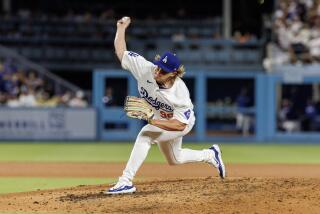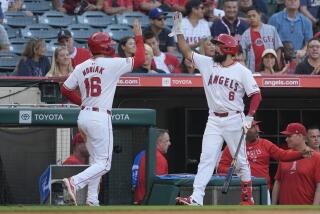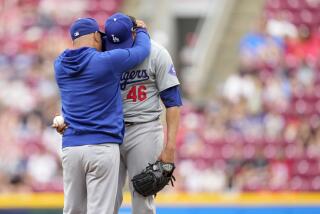BASEBALL : McLemore, Orioles Successful Together
The Baltimore Orioles’ 13-4 dominance in their new ballpark at Camden Yards is only one reason the Orioles have become a bona fide contender in the American League East.
Brady Anderson has become a fine leadoff hitter, Chris Hoiles has emerged as one of baseball’s most productive catchers, Rick Sutcliffe has revived his career and provided leadership for a young rotation, and two young starters, Ben McDonald and Mike Mussina, are fulfilling expectations.
Then there is Mark McLemore--the same Mark McLemore who was the second baseman in what the Angels thought would be their home-grown infield of the 1990s, the same Mark McLemore who has been with 10 teams since the start of the 1990 season.
“He’s right up there with the things that have put us over the top so far,” Manager John Oates said. “He’s done everything we’ve asked.
“I mean, he’s a two-time released player, but I look at the things he’s done for us in the three months we’ve had him and say, ‘No way (he could have been released twice).’ ”
He was also traded by the Angels, who have no one left from their once-touted “infield of the ‘90s.”
Third baseman Jack Howell was dealt to the San Diego Padres last July for Shawn Abner; shortstop Dick Schofield was displaced by Gary DiSarcina and traded to the New York Mets in April for pitcher Julio Valera and a player to be named; first baseman Wally Joyner left as a free agent in December, and McLemore was traded to the Cleveland Indians for backup catcher Ron Tingley in September of 1989.
McLemore was released by the Indians, signed by the Houston Astros, released by the Astros and signed by the Orioles.
In the last two years he has gone from the Angels to Edmonton to Palm Springs to Colorado Springs to Cleveland to Houston to Tucson to Jackson to Rochester and to Baltimore.
“It was rough, but I always kept the faith,” McLemore said. “I always believed I could make it if the opportunity was really there for me.”
The Angels said it was, but McLemore isn’t certain how sincere they were.
Then-manager Gene Mauch said of the fleet and flashy 1987 rookie that the job would be his if he hit .240. McLemore hit .236 in 138 games, but the Angels traded for Johnny Ray in August. That was compounded by a nerve irritation that sent McLemore back to the minors in ‘88, precipitating his odyssey.
“The Orioles are counting on me,” he said. “This is the first time I’ve had that feeling, and it’s lifted my confidence. With the Angels and others, I always had the feeling they were using me because they had no one else. They made their decisions and it was hard to deal with at the time, but there’s no sense dwelling on it or being bitter about it. I can’t change anything.
“I now look forward to going to the park every day and doing whatever it takes to help the team win. The people here are honest, straightforward. Everyone needles everyone else in the clubhouse. It’s a special feeling that I’ve never had before.”
The Orioles, looking to improve their utility situation, took McLemore, 27, and a resident of Diamond Bar, to spring training as a nonroster player.
“I told him the only way he could make the club was in a utility role,” Oates said.
A hot spring, during which McLemore also played shortstop and third base, changed that perspective and sent Juan Bell back to the minors.
McLemore has since formed what is basically a second base platoon with Billy Ripken, giving the club more speed and versatility at that position.
He hit .364 in April and was at .277 through Friday. He had scored 13 runs and driven in 12 in his part-time role.
He scored from second base on a fly out to center field against the Texas Rangers Tuesday and ignited a recent four-run rally against the Minnesota Twins with an improbable dash from first to third on Sam Horn’s sharp single to center, drawing a throw that allowed the lumbering Horn to take second.
“I’ve hit him second, I’ve hit him ninth and there’s a very good chance I’ll hit leadoff when Brady gets a rest,” Oates said of McLemore, who knows that one month doesn’t make a season but who has enjoyed wearing the same uniform for a month.
BACK FROM THE . . .
It’s not just a name game for Brad Brink. The 27-year-old right-hander, a three-year pitching star at USC and the Philadelphia Phillies’ No. 1 draft choice in 1986, makes his major league debut against the Cincinnati Reds today, an assignment that he and others felt might never come.
Overworked, perhaps, at USC, Brink battled shoulder problems for his first five years in the Phillies’ system. He had rotator cuff surgery in 1989 and did not pitch again until 1991.
He went to spring training this year as a nonroster player, displayed some revived velocity, pitched effectively at triple-A Scranton and was recalled the other day to help rebuild an injury-ravaged pitching staff.
“When you’re going through all that rehab, people keep asking you why,” Brink said of almost two years without pitching. “But when the manager tells you you’re going to the majors, that’s why. I mean, it’s unbelievable. My Adam’s apple dropped into my stomach.”
Asked if he did, indeed, pitch too many innings at USC, then coached by Rod Dedeaux, Brink responded cautiously.
“I could have said no, but I never did,” he said. “Maybe now I would, but there’s nothing to gain by looking back.”
Today’s assignment is a reward for Brink’s tenacity and spirit, but it might not have happened if Ken Howell, Jose DeJesus, Andy Ashby, Tommy Greene and Pat Combs hadn’t been lost because of injuries.
The Phillies have used the disabled list 11 times, and their earned-run average of 4.77 on Friday was a full run higher than any other National League team. Terry Mulholland, one of their few uninjured starters, didn’t win in April, and another, former Angel, Kyle Abbott, the left-hander from Cal State Long Beach, hasn’t won yet.
Abbott’s 0-6 record has the Phillies thinking they might have to send him to the minors to restore his mental outlook. “This is definitely frustrating,” he said, “but if you let a kids’ game beat you down, how strong can you be mentally?”
BULLPEN DISASTER
The Dodgers?
Well, yes.
But the Atlanta Braves, their National League West rival, have been smitten as well.
The Braves, through Friday, had lost eight games in their opponents’ last at-bat. They had been outscored after the fourth inning, 81-52. Since May 1, they had lost games in which they scored seven, 10 and 11 runs, and their bullpen in that span was 1-6 with two saves, having given up 59 hits, 28 walks and 25 runs in 42 innings.
“I still feel I’ve got the right guys, but they’re just not getting it done right now,” Manager Bobby Cox said of Alejandro Pena, Juan Berenguer and Marvin Freeman.
Former Dodger Pena, who received a $2.6-million contract after he was acquired from the Mets last Aug. 29 and was 11 for 11 in September save opportunities, is 0-4, having lost three games since May 5, blowing two saves in the process.
Said Cox: “He’s not throwing as hard as he was last year.”
Said Pena: “I can’t be more disappointed. I’m more disappointed than at any time in my career.”
JULIO’S IMPACT
The Texas Rangers looked as if they might steamroller the American League West, scoring 53 runs as they won six of their first seven games.
But they have since averaged only 3.6 runs a game with a still potent lineup that obviously misses the spark of American League batting champion Julio Franco, who has been sidelined by a mysterious injury to his right knee.
Franco, being treated in Austin, has appeared in only eight games, and batting instructor Tom Robson said: “Other guys watch him and feed off him. He has an arrogant attitude about hitting that is contagious.”
How contagious? Since 1989, Rafael Palmeiro has hit .311 with Franco in the lineup and .252 when he has been out. Ruben Sierra has hit .300 with Franco in the lineup and .272 when he has been out.
“He’s good for me and Ruben,” Palmeiro said. “He keeps us mentally in the game, but we’re going to have to learn to deal with it. We may lose him for the rest of the year.”
BOBBY BOO
Are the boos and the biting headlines in New York having an impact? Bobby Bonilla came into Dodger Stadium Friday night with a .318 average on the road but is hitting only .214 at Shea Stadium.
Has the former Pittsburgh Pirate free agent from the Bronx been pressing in his homecoming with the Mets, trying to convince the neighbors that he is worth that $29-million contract?
Manager Jeff Torborg said it would be natural if Bonilla were trying to do too much, carry too much of the load. But Bonilla said he loves playing at home, that he doesn’t consider it a mistake to have signed with the Mets and that he is simply battling through a slump.
“It’s not my first and not my last,” he said.
Bonilla has failed to hit a homer since hitting two on opening day, had only seven extra-base hits among his Saturday total of 30 and stayed at Shea until 1 a.m. the other morning, working in the batting cage with hitting instructor Tom McCraw.
Of the fans’ reaction, Bonilla said: “If they’re looking for me to be Darryl Strawberry, I’m not. I’m Bobby Bo. I’m just looking to be part of a winning effort, and this would be a lot tougher if we weren’t winning. There would be a lot more attention focused on it.
“I mean, if I’m in the eye of the storm now, I’d be in the middle of the hurricane if we weren’t winning.”
Despite his problems, the Mets remain enthusiastic about his presence in the clubhouse, hustle on the field and defensive work in right field.
Bonilla smiled and said: “If I’m not going to get any hits, I can’t afford to give up any.”
More to Read
Go beyond the scoreboard
Get the latest on L.A.'s teams in the daily Sports Report newsletter.
You may occasionally receive promotional content from the Los Angeles Times.






